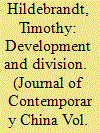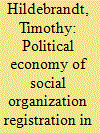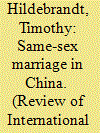|
|
|
Sort Order |
|
|
|
Items / Page
|
|
|
|
|
|
|
| Srl | Item |
| 1 |
ID:
114231


|
|
|
|
|
| Publication |
2012.
|
| Summary/Abstract |
Identity movements, such as those representing LGBT communities, are assumed to be highly universalized; they are often thought to be highly dependent upon international linkages in order to emerge and develop. Although the Chinese LGBT movement owes much of its development to global civil society and international donors, this article presents survey and interview data that show its linkages with the international community are not as strong as we might expect. The article shows that economics and politics of transnational activism in China are tightly intertwined. The means by which LGBT activism has developed in China has simultaneously contributed to division within its ranks and with global civil society: the nature of international funding-while from foreign sources it is funneled through the Chinese government-and local political conditions ultimately impedes the growth of stronger transnational linkages.
|
|
|
|
|
|
|
|
|
|
|
|
|
|
|
|
| 2 |
ID:
124578


|
|
|
|
|
| Publication |
2013.
|
| Summary/Abstract |
The debate around humanitarian intervention and the responsibility to protect generally concerns a collective action problem on the international level: motivating states to participate in a multilateral coalition to stop a mass atrocity. This debate presupposes that states enjoy a domestic consensus about their rights and responsibilities to intervene. This article reconsiders this assumption and examines the sources of domestic political will for intervention, particularly the role of partisanship, ideology, and public opinion on Congressional members' willingness to support US intervention for humanitarian purposes. We analyze several Congressional votes relevant to four episodes of US humanitarian intervention: Somalia, Haiti, Bosnia, and Kosovo. We find that public support for humanitarian intervention increases Congressional support and that other political demands, primarily partisanship and ideological distance from the president, often trump the normative exigencies of intervention. Our findings shed light on the domestic political dynamics behind humanitarian intervention and can help explain why some recent humanitarian missions have proceeded without seeking Congressional approval.
|
|
|
|
|
|
|
|
|
|
|
|
|
|
|
|
| 3 |
ID:
114580


|
|
|
|
|
| Publication |
2011.
|
| Summary/Abstract |
The Chinese government uses legal registration to manage and control the rise of social organizations. To avoid negative government attention, organizations might be expected to actively pursue such registration. However, in-depth field research of Chinese NGOs in three issue areas (environmental protection, HIV/AIDS prevention, and gay and lesbian rights) reveals that this is not always the case. There are many conflicting political and economic incentives for both NGOs and government, complicating understandings of social organization registration in China. By shedding light on the process of registration, this article reveals the complexities of state-society relations and demonstrates the difficulties for social organizations to avoid significant government interference.
|
|
|
|
|
|
|
|
|
|
|
|
|
|
|
|
| 4 |
ID:
105651


|
|
|
|
|
| Publication |
2011.
|
| Summary/Abstract |
Using the case of same-sex marriage in China, this article explores two fundamental questions: What motivates a non-democratic state to promulgate a progressive human rights policy? More importantly, when a non-democratic state adopts such policies, what is the impact on activism? I argue that same-sex marriage legislation could be used strategically to improve China's human rights reputation. While this would extend a pinnacle right to gays and lesbians, the benefits might not outweigh the costs: I show that when imposed from above, a same-sex marriage law would incur opportunity costs on activism; the passage of this progressive policy would eliminate an important issue around which the Lesbian, Gay, Bisexual and Trans-gender/-sexual (LGBT) community might develop. Moreover, even if such policy is promulgated, the right to marry will do little to challenge the larger social pressures that make life difficult for LGBT Chinese.
|
|
|
|
|
|
|
|
|
|
|
|
|
|
|
|
|
|
|
|
|